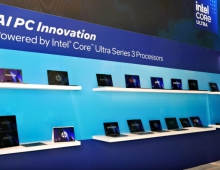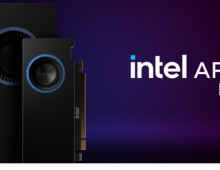
Intel Seeks to Advance Probabilistic Computing
Intel is forming a strategic research alliance to take artificial intelligence (AI) to the next level, seeking for new ways to help self-driving cars deal with the uncertainty of the real world.
A key barrier to AI today is that natural data fed to a computer is largely unstructured and "noisy."
It's easy for humans to sort through natural data. For example: If you are driving a car on a residential street and see a ball roll in front of you, you would stop, assuming there is a small child not far behind that ball. Computers today don't do this.
They are built to assist humans with precise productivity tasks. Making computers efficient at dealing with probabilities at scale is central to our ability to transform current systems and applications from advanced computational aids into intelligent partners for understanding and decision-making. According to Intel CTO Mike Mayberry the answer is "probabilistic computing", which he says could be AI's next wave.
"Autonomous systems don't have good enough ways to respond to the uncertainties of the real world, and they don't have a good enough way to understand how the uncertainties of their sensors should factor into the decisions they need to make," Mayberry said.
Probabilistic computing is one key component to AI and central to addressing these challenges. Intel believes that probabilistic computing will allow future systems to comprehend and compute with uncertainties inherent in natural data, which will enable the development of computers capable of understanding, predicting and decision-making.
Intel is observing an unprecedented growth of applications that rely on analysis of noisy natural data - different and even conflicting information. Such applications aim to assist humans with a higher level of intelligence and awareness about the environments in which they operate. "Cutting through this noisy minefield is central to our ability to transform computers into intelligent partners that can understand and act on information with human-like fidelity," Mayberry said.
Research into probabilistic computing is not a new area of study, but the improvements in high-performance computing and deep learning algorithms may lead probabilistic computing into a new era. In the next few years, Intel expecst that research in probabilistic computing will lead to significant improvements in the reliability, security, serviceability and performance of AI systems, including hardware designed specifically for probabilistic computing.
To accelerate the work in probabilistic computing, Intel is increasing its research investment in probabilistic computing and is working with partners to pursue this goal.
Realizing the full potential of probabilistic computing involves holistic integration of multiple levels in computing technology. Today, Intel underscored its commitment to integrated and collaborative implementation of emerging computing architectures and a sound ecosystem enablement strategy by issuing a call to the academic and start-up communities to partner with us to advance probabilistic computing from the lab to reality across these vectors: benchmark applications, adversarial attack mitigations, probabilistic frameworks and software and hardware optimization.
"We are incredibly eager to see the proposals to advance probabilistic computing and to continue this research with the potential to raise the bar for what AI can help us achieve," Mayberry added.
Intel expects academic proposals to be submitted by May 25th and among them the company will select the best research teams.
Intel began this journey with research into neuromorphic computing - focusing on understanding of the human brain and its associated computational processes. The start of the neuromorphic research community announced on March 1 is also on track and Intel is planning to continue to scale up our Loihi on the cloud to allow researchers access to cutting-edge hardware. Intel sees a path to reach 100 billion synapses on a single system in 2019.
Furthermore, Intel has already been working to decode the brain and advance the next stage in neuroscience as part of a research partnership with Princeton University.
Seperately, Intel CEO Brian Krzanich today called for the need of a national strategy on Artificial Intelligence.
"China, India, Japan, France and the European Union are crafting bold plans for artificial intelligence (AI). They see AI as a means to economic growth and social progress. Meanwhile, the U.S. disbanded its AI taskforce in 2016. Without an AI strategy of its own, the world's technology leader risks falling behind," Krzanich said. He called for a U.S. national strategy that would provide the structure for researchers and industry to follow as they develop artificial intelligence.





















